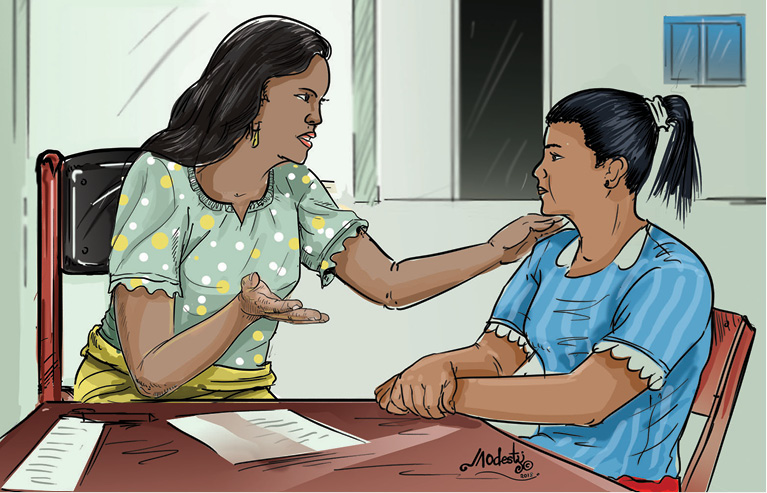Social work: Solution to children cultism, drug abuse, rape
With the rise in the number of out of school children, cases of drug abuse, rape, cultism, insecurity to children among others, experts have harped on the need for enhanced quality of life for Nigerian children through established legal framework that will empower social workers to check social vices among children. President Muhammadu Buhari recently […]

With the rise in the number of out of school children, cases of drug abuse, rape, cultism, insecurity to children among others, experts have harped on the need for enhanced quality of life for Nigerian children through established legal framework that will empower social workers to check social vices among children.
President Muhammadu Buhari recently declined assent to the Nigerian Council for Social Works bill which seeks to regulate the practice of professional social workers in the country.
It was gathered that the president withheld assent because there is no clear cut delineation of what a social worker does and where they would be found in the bill among other reasons.
However, academics and experts have sought for the passage of the bill which seeks to establish the Nigerian Council for Social Work and its governing board and to promote professional practice and uphold social work ethics and values among social workers.
They said social workers will help proffer solutions to the various social vices against children and help promote their rights.
According to United Nations Children’s Fund (UNICEF), child protection right is costly for the society and that the estimated economic value that Nigeria lost due to some selected health consequences of violence against children in 2014 amounted to $8.9bn which represents 1.58 per cent of the country’s GDP.
Child Protection Specialist at UNICEF, Maryam Enyiazu, speaking recently at a workshop on ‘Social Work Professional Bill’ organized by the Ministry of Information and Culture and Ministry of Women Affairs and Social Development (FMWASD) in partnership with UNICEF, said a research they carried out showed that the total loss of earnings attributable to Violence Against Children (VAC) was $6.1 billion amounting to 1.07 per cent of Nigeria’s GDP.
Enyiazu said: “The nation is yet to understand the need for social welfare workers in the country,” noting that underfunding, lack of regulation and misunderstandings are key factors militating against social welfare workforce.
Social welfare for children is one of the elements of the Child Protection System which plays a key role in preventing and responding to violence, exploitation, abuse and neglect of children but Nigeria negligible number of social workers to help manage and educate children on how not to fall victim of violence and abuse.
A Professor of Sociology and Social Work at Federal University Lafia, Prof Alamveabee Idyorough, said social work is a helping profession that uses knowledge and skills developed from the social sciences and the environment to prevent, remediate and resolve social problems affecting individuals, social groups and the communities so as to enhance the quality of social functioning and bring about social development.
While emphasizing the importance of social workers in protecting children, he said many children are likely to fall victims of wrong doing.
He said a research carried out in some selected states in Nigeria showed that 1306 juveniles were committed into care in 32 juvenile correctional institutions
“These juveniles need professional social workers to handle them properly and to reform and re-integrate them,” he stated.
A lecturer at University of Jos, Dr Nancy Katu-Ogundimu, who spoke on Social Welfare/Protection as Panacea for Peace in Nigeria, said social workers play important roles in the US where they promote and protect children’s rights.
She said they educate children on how to protect themselves against violence from any quarter, adding that in most cases some children preferred to speak and confide with the social workers than their ever busy parents.
With legal backing, she said social workers can address issues around child abuse, rape and drugs among other social vices.
She however, linked social welfare of the citizenry with social cohesion and peace in Nigeria, saying that maintaining social welfare can make a positive contribution towards maintaining inclusive development and order.
“This means that lack of access or inequitable access to social welfare is a major driver of conflict. We can therefore say that having a social welfare policy is not only timely, it is very crucial for Nigeria,” Dr Katu-Ogundimu said.
She stressed that Nigeria is currently facing one of the greatest threats to its economic, social, and political stability, from the Niger Delta militants to threats by the Indigenous People of Biafra (IPOB), terrorism by Boko Haram, and sectarian conflicts in Plateau State and farmers/herdsmen conflict.
Signing the bill, according to her, will make a positive impact on the issues.
The National President of Medical Social Workers of Nigeria, Abubakar Bichi, said although social workers are everywhere to assist in emergencies, the profession does not have an enabling law like its counterparts.
The Director of Social Welfare of the Federal Ministry of Women Affairs and Social Development (FMWASD), Temitope Osonuga, said as issues bothering on human right increase in Nigeria, there is an increasing demand for social workers and their services and the need to adequately equip them with the right skills in specialized areas.
The ministry, she said, will also work assiduously and advocate strongly with the National Assembly and other relevant government agencies for increased budgetary allocation to the ministry and entire social development sector.
